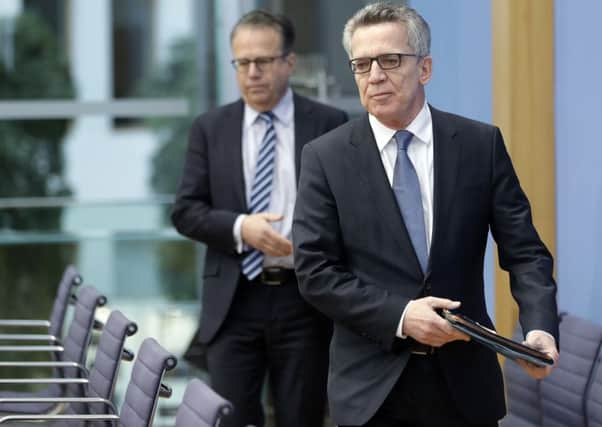Huge drop in asylum-seekers heading to Germany in 2016


Arrivals declined sharply with the closure of the Balkan migrant route in March and the subsequent agreement between the European Union and Turkey to stem the flow across the Aegean Sea to Turkey.
Asylum applications have lagged well behind arrivals and many people who came to Germany in 2015 applied only last year.
Advertisement
Hide AdAdvertisement
Hide AdThe figures released yesterday showed that 745,545 formal asylum applications were made last year – 268,869 more than in 2015.
Those included 268,866 applications from Syrians, 127,892 from Afghans and 97,162 from Iraqis – the biggest single groups by far.
The Federal Office for Migration and Refugees, which has been strengthened in the course of Europe’s migrant crisis, decided last year on more than 695,000 asylum applications, more than twice as many as in 2015.
Nearly 60 per cent of applicants were granted either full refugee status or a lesser form of protection. Interior minister Thomas de Maiziere said that about 55,000 migrants returned home voluntarily last year, compared with the previous year’s 35,000. Another 25,000 were forcibly deported.
He said: “This shows that the measures that the federal government and the EU have taken are taking hold. We’ve been successful in managing and controlling the process of migration.”
The number of returns is still too low, Mr de Maiziere said, adding that talks are under way with state authorities – who are responsible for returns – to push it up.
He was referring to the EU’s deal with Turkey to halt the influx of migrants and refugees into Greece, as well as the decision by Balkan countries to close off the route towards Western Europe.
Migrants headed for Germany after Chancellor Angela Merkel ordered a temporary open-door asylum policy.
Advertisement
Hide AdAdvertisement
Hide AdHer decision to suspend EU rules on registering asylum seekers in the first EU state they entered was aimed at the growing number of Syrians fleeing the conflict in their country, but large numbers of people of other nationalities made the journey too. Migration has become a politicised issue in Germany ahead of federal elections in the autumn. As voters punished her CDU party in regional polls last year, Mrs Merkel acknowledged that the migrant crisis could have been handled better.
Germany has rejected asylum requests from Albania, describing it as a “safe country”, and has been deporting Afghan arrivals. The government said last year that increasing numbers of asylum seekers were returning to Iraq as well as Afghanistan. Of the record 695,733 asylum decisions made by the interior ministry last year, 256,136 were awarded refugee status under the Geneva Conventions and a further 153,700 given subsidiary protection, which means their status in Germany is initially temporary. Right-wing groups blamed the policy for terror attacks carried out by migrants, including the massacre at a Christmas market in Berlin.
Mrs Merkel has promised a “national effort” to ensure people who are not entitled to stay go home after revelations attempts to deport Isis supporter Anis Amri had failed months before he committed the Berlin attack.
Migration and security have dominated the debate ahead of Germany’s federal elections, where Merkel will be running for a fourth term. Despite the fall in numbers, 2016 was the deadliest ever year for refugees, after the EU-Turkey deal made the main route revert to the far wider and more treacherous central Mediterranean.